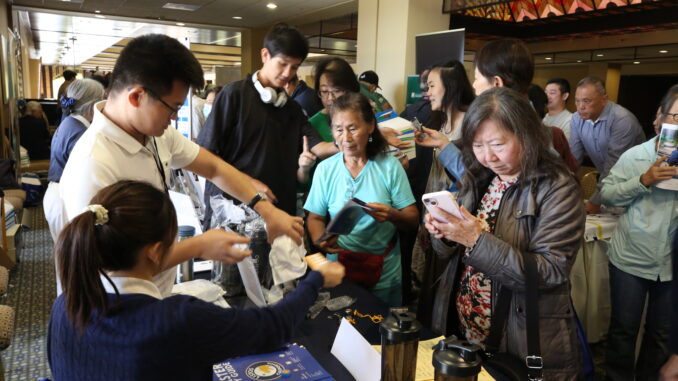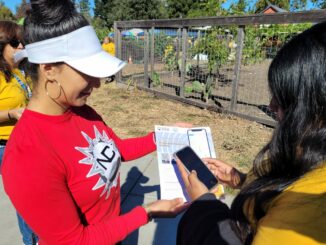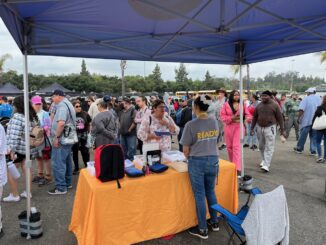
Buddhist Tzu Chi Foundation engages hard-to-reach populations about the importance of emergency preparedness
by M.S. Enkoji
Sitting in the dark with no power is the wrong time to contemplate what you need to do in case of emergency: “When the power is out and you want to prepare, it’s too late,” says Erika Wang, program manager for Buddhist Tzu Chi Foundation.
Preparing in advance is a constant message Wang emphasizes through her work with Buddhist Tzu Chi Foundation, an international humanitarian organization founded in Taiwan that spread to the U.S. in 1989 and is now in 25 states. The organization’s name translates to “compassion and relief.”
The foundation’s disaster relief provides financial support, supplies and other relief efforts during disasters such as the 2021 earthquake in Haiti and 2023’s wildfires on Maui. They helped during the Los Angeles wildfires in January 2025, and kept working as heavy rains in the fire-ravaged region caused mudslides and power outages that affected 200,000 households and businesses.
“It’s not just about giving out food and water.”
Erika Wang, Program Manager, Buddhist Tzu Chi Foundation
“It’s not just about giving out food and water,” Wang says, adding that power companies rely on community-based organizations like Tzu Chi to keep people informed.
As program manager at the organization’s San Dimas national headquarters, Wang is responsible for conveying information from disaster relief officials to the widest population possible, including immigrants, senior citizens and those with limited English proficiency. Part of that effort for her is reaching people and talking face to face at events like food distributions in the Inland Empire.
Trained volunteers educate people about preparedness before disaster strikes and the importance of signing up for phone alerts for all disasters with the California Governor’s Office of Emergency Services (Cal OES) at listoscalifornia.org.
Local power providers also provide power outage information with real time updates, she says. They also provide what’s called medical baseline discounts for those who rely on power for life-saving equipment like ventilators. Those programs also provide extra service during power outages to those households. Signing up for alerts from your phone company is the first step to accessing these services.
Some basic points she stresses are making an emergency plan to share with your family; keeping a go-bag with money, medication, documents, a phone charger and important keys on-hand; and providing for your pets with food and medications.
For extended power outages, a “stay box” is important, she says. This should include enough water and non-perishable food for three days, a radio that operates without batteries, and—if possible—a generator. By providing for yourself, you’re better prepared to help friends and neighbors, she says.
Educating and building awareness needs to extend beyond face-to-face contact to be more effective, Wang says, noting the group is always looking to expand their outreach.
More information on the Buddhist Tzu Chi Foundation can be found at tzuchi.us.
Don’t Get Left in the Dark
- Plan for your essential power needs, including powering medical equipment, keeping medications refrigerated, communications and more
- Have back-up batteries, portable chargers or power banks for devices like cell phones and necessary devices
- Have paper copies of important information like emergency contacts and medications
- Avoid opening your refrigerator/freezer to keep perishables cold as long as possible. Use ice if necessary
- Use battery-powered flashlights instead of candles
For more information on how to prepare for and stay safe during power outages and other emergencies, visit www.listoscalifornia.org.




